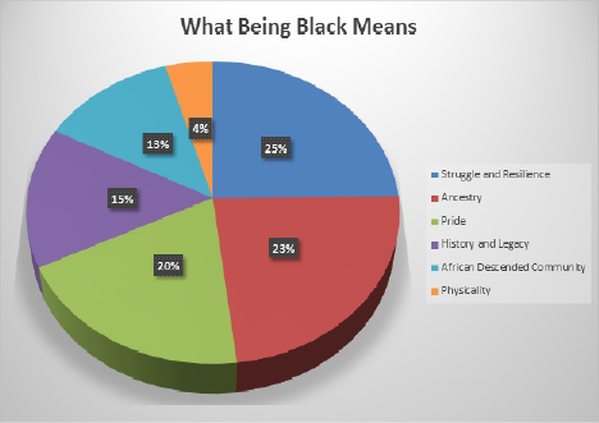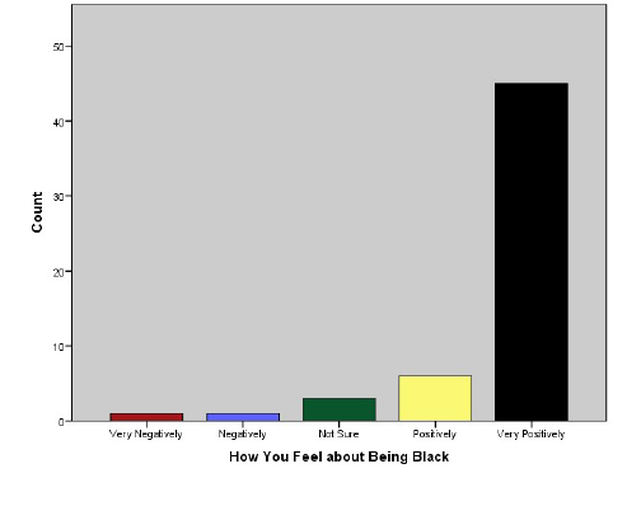|
Oakland, CA An Afrometrics Poll on Self Definition conducted in February, 2013 highlights how many African Americans\Black people define racial identity in multidimensional ways that transcend dictionary definitions and common scientific definitions of race. African Americans\Black people were surveyed about how they define what it means to be African American\Black. They were also asked how they felt about being African American\Black. Responses to the question, “What does being African American\Black mean to you?” were coded into categories representing common themes. The initial categorization had an intercoder reliability rating on 85.7% representing strong reliability. The African American\Black respondents who participated in this study most frequently mentioned six aspects of what it means to be African American\Black: 1) Struggle and Resilience, 2) Ancestry, 3) Pride, 4) History and Legacy, 5) African descent Community, and 6) Physicality. Struggle and Resilience The most common aspect of what it means to be Black mentioned in this study was struggle and resilience. Twenty-five percent of the participants in this study identified being Black with being a part of a struggle for justice and equality against the forces of racism and other forms of oppression. Respondents made statements such as:
Ancestry Twenty-three percent of respondents mentioned their ancestors as a significant part of what it means to be Black\African American. It appears that the conception of a Black identity in the present day is informed by one’s ancestors. Respondents made statements such as the following:
Pride Twenty-three percent of the participants in this study identified being African American\Black with pride. They defined their racial identity as a source of personal and collective pride and empowerment. Respondents made statements such as:
History and Legacy Respondents indicated that the meaning of being Black involved being rooted in history. To have a sense of the history associated with being Black seems to suggest an awareness of the memory and legacy of an African origin, descent, and historical events that mold Blackness as a racial identity. Fifteen percent of respondents stated that being Black was informed by the past in that it connects one with Africa. This is exemplified by statements like the following:
African Descent Community Thirteen percent of respondents referenced being of African descent, having membership in a globally diverse African-descended community, and embracing culture, tradition, and a value system that is more far-reaching than geographical constraints. Respondents made statements such as the following:
Physicality Least common among the respondents’ descriptions of what it means to be Black was specific reference to physical features and phenotype. Four percent of respondents stated that being Black meant displaying some physical characteristic that represents racial distinction. This is characterized by statements such as the following:
Respondents were also asked to indicate how they felt about being African American\Black on a scale ranging from “very negatively” to “very positively.” Respondents were also asked to indicate their annual income level, highest level of education, age, and gender. A Pearson correlation was calculated for the relationship between respondents’ feelings about Blackness and respondents’ annual income level, highest level of education, age, and gender. A positive relationship was found (r(55) = -.220, p<.05), indicating a statistically significant positive correlation between respondents’ feelings about being African American\ Black and their levels of education (See Table 2). As respondents’ levels of education increased, there was an increase in their feelings about being African American\Black, indicating that the higher Black people’s education levels were, the more likely they were to feel positively about being African American/Black. This finding indicates that the large majority (91%) of African Americans in this sample feel positively about being Black. Dialogue about racism should be careful to differentiate African American\Black people's attitudes about racial identity and their attitudes about racism. It is important to understand that negative attitudes about racism do not equate to negative attitudes about racial identity.
0 Comments
|
AuthorWritten by Serie McDougal and Sureshi Jayawardene ArchivesCategories |


 RSS Feed
RSS Feed